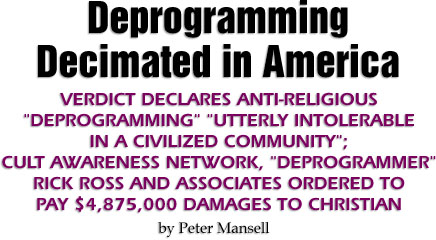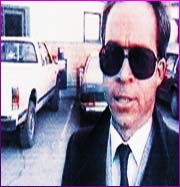

Seattle, Washington, jury has sent a crystal clear message to the Cult Awareness Network (CAN) and anti-religious “deprogrammers”: violent assaults on religious freedom are “so outrageous in character and so extreme in degree as to go beyond all possible bounds of decency and [are] to be regarded as atrocious and utterly intolerable in a civilized community.”
In the largest civil verdict ever issued against an anti-religious “deprogrammer,” CAN and three affiliated henchmen were ordered to pay damages of almost $5 million to a Christian man after attempting to forcibly break his religious beliefs.
On September 29, in the U.S. District Court in Seattle, CAN and the “deprogrammers” were also found guilty of negligence and conspiracy to deprive 18-year-old Jason Scott, a member of the Life Tabernacle Church, affiliated with the United Pentecostal Church, of his right to freedom of religion.
Scott’s ordeal began in 1991, shortly after his mother, Kathy Tonkin, ended her own involvement with the Life Tabernacle Church. Scott remained in the Church, but continued living with Tonkin, hoping to preserve a newly achieved family unity after years of problems, largely stemming from Tonkin’s failed relationships.His attempts were thwarted when Tonkin contacted Shirley Landa, CAN’s representative in Washington. Although Landa admitted during the trial that she had no knowledge of the Life Tabernacle Church at the time, she alarmed Tonkin with fears that her son was in a “cult” and recommended “deprogramming.” Inflamed by Landa, Tonkin kicked her son out of the family home.
Landa referred Tonkin to Rick Ross, praised by CAN’s director, Cynthia Kisser, as “among the half-dozen best deprogrammers in the country.”
What qualifications does it take to attain such an authoritative position that you can decide the fate of another’s beliefs? There are none. But in Ross’ case he admitted during the trial that he had no more than a high school education. No qualifications in religion, counseling... nothing.
But what Ross did have was a prior conviction for grand theft after attempting to embezzle $100,000 in jewelry from a store in Phoenix, Arizona, and a diagnosis of “sociopathic inclinations” from his prison psychiatrist.
After agreeing with Tonkin on a price of about $1,300 a day plus expenses for himself and his team, Ross set to work on breaking Scott’s faith.
The jury heard Scott’s own description of this ordeal on the first day of trial, September 21, 1995.
While visiting his mother during his continuing attempts to restore some family harmony, Scott was jumped by Ross’ three-man “security team” — Charles Simpson, Mark Workman, and Clark Rotroff. The three wrestled Scott to the ground and dragged him into the house where Simpson handcuffed him so tightly his circulation was severely impaired.
He was then dragged outside, thrown into a van face down on the floor, and driven off with his ankles tied, two-inch duct tape over his mouth, and the 300-pound Simpson sitting on his back. Along the way he was told to “stop praying and shut up.”
The van drove to Ocean Shores, Washington, where Scott was held prisoner for five days in a remote beach house with straps nailed over the windows to prevent escape. A motion detector monitored his movements. Two men guarded the door at all times, and accompanied him when he had to use the toilet.
At trial, Scott was aided by Clark Rotroff who realized after the incident that he had been led by lies and deception from Ross and the others into participating. They had told him that Scott was a minor, that deprogramming was legal and that he would be helping a “distraught mother.”
Rotroff told the court that what he actually witnessed horrified him. In addition to the violence and obvious violation of Scott’s personal freedom, Rotroff testified that he was shocked by Ross’ nonstop abuse and degraded treatment of Scott and his religion.
After the fourth day, severely fatigued, physically injured and with no hope of escape or rescue, Scott pretended to abandon his faith and to agree that the “deprogramming” had “worked.”
The deprogrammers took Scott to a local restaurant to “celebrate” where he was allowed to go to the men’s room on his own. Instead he bolted out the restaurant door.
By the time Scott managed to stop a passing vehicle to call the police, Ross and the others realized they had been fooled and were on his trail. When a frantic Scott told the driver he was escaping from kidnappers, the driver sped off, abandoning him.
Scott ran to another restaurant where he called the police, who arrived to find Scott running toward them holding aloft his ID to prove he was not a minor.
The verdict is the clearest statement a court has ever issued that “deprogramming” is merely a euphemism for criminality, said Scott’s lawyer, Kendrick Moxon.
“The term ‘deprogramming’ was coined in the ’70s to camouflage what have always been criminal acts,” said Moxon. “If you want to violently control someone’s religious beliefs with impunity, it helps if you can convince people you are just ‘undoing’ something negative. Then ‘kidnap’ becomes ‘rescue.’ There never was any truth in it and this jury saw that.”
In his summation, Moxon told the jury that while assessing compensatory damages, they should include as real damage the irreparable harm done to Scott’s family relationships by CAN’s false and hate-filled propaganda and by referring his mother to a convicted felon like Ross.
Scott’s direct financial losses amounted to very little, said Moxon, so the jury’s decision to award $875,000 compensatory damages against CAN, Ross, Workman and Simpson was a clear message that they saw a direct relationship between CAN’s involvement and the destruction of the family.
The jury also heeded Moxon’s request to send a message to the entire CAN organization and its contact persons and affiliates that their abuse must cease. The jury awarded $2.5 million punitive damages against Ross, $250,000 each against Workman and Simpson, and $1 million against CAN.
While thanking the jury, Judge John C. Coughenour told them he considered their decision “very reasonable.”
It is the first time either CAN or Ross have been found liable in a civil case for their involvement in deprogramming. Fittingly, the decision came in the middle of Religious Freedom Week, an event proclaimed annually by Congress.The decision, and Ross’ own testimony during the trial, shattered any lingering remnants of credibility he may have held. He referred to Fundamentalist Christians as “Bible-intoxicated extremists” and said that speaking in tongues — a fundamental practice in many Christian groups — leads to mind control.
Nor was Ross’ position assisted by the closing remarks of his attorney Derek Vanderwood. The only thing Vanderwood could conjure up to counter the charge that Ross was motivated by prejudice, intolerance and religious hatred, was to argue that, if anything, the evidence during trial proved that Ross was motivated by money.
Further evidence of the base motivation of CAN and Ross came just weeks after the verdict. Rather than seeking to remedy their ways, CAN and Ross both immediately sought to duck the consequences of their misconduct by declaring bankruptcy. Their only concern was avoiding the cost of their misdeeds, not facing the truth of them.
The only logical conclusion appears to be that CAN’s very existence centers around the perpetration of crime. That being so, those in America and across the world can rest easier knowing that this verdict signals the vanquishment of a significant threat to their religious liberty.






